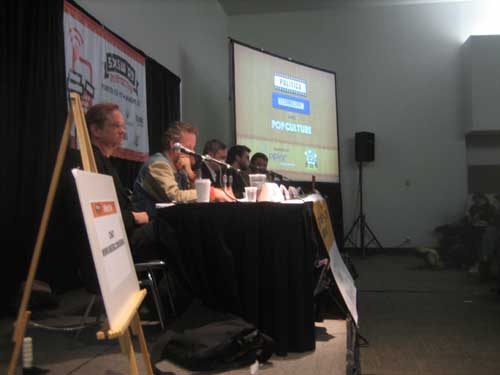Politics, Technology, and Pop Culture, comprised of Lawrence Lessig of Stanford Law School, Alex Wellen, Deputy Political Director of Digital Content at CNNPolitics.com, Dan Patterson of ABC News, Tom Serres CEO of Piryx Inc, Amber Ettinger (Obama Girl) and Mark McKinnon Vice Chairman of Public Strategies Inc.

McKinnon, commented on the earlier Republican campaigns saying, “Nobody even had Blackberries. The whole process took a matter of days.” Compared to his experience on the McCain campaign he said “we really had what I call a democratization of politics and… the campaigns lose control of their message.”
He said of Dean and Obama, “They knew how to make technology harness the passion and talents of their followers.”
Patterson spoke to the technology gap between generation Y and baby boomers and said that it was “more of a perceived gap than an actual gap,” and that he has not so much witnessed a real technology gap. “It will eventually work itself out,” he said.
Wellen, made a few comments about how they at CNN look at the shift.
“Politics pushes us forward,” he said. “I spend all my time thinking about integration or convergence… It’s starting on TV and its pushing people and attracting them to go to the web” and visa versa. He explained that the Holy Grail is when they are both being used in a “Two screen experience.”
Lessig weighed in on the 2008 election saying “participation was more than just a cool ap. Participation was something that you thought you were going to actually move politics.”
He warned that if things don’t change with Obama, “we’re going to be extraordinary let down if it isn’t something very different.” He went on the explain that Washington is full of ordinary politicians and “the question is whether Obama will be able to carry it to the next level and actually be able to change them too.”
Serres, asked McKinnon to comment on his recent article about how he believes that Twitter has “jumped the shark.” McKinnon exclaimed that “the problem is that people are confused into thinking that more communication is better communication and then it just becomes noise”
“Increasingly we have to be able to step back and think that the message is about quality not quantity.”
Patterson jumped in and defended Twitter based on the utilization of filtering aps and the usefulness of Twitter as a tool for communication. He cited several examples of his use of it in his profession as a journalist.
The conversation then turned the attention to the pop culture side of the discussion as Serres asked Ettinge to describe her experience of being a “human meme.”
“It’s been a crazy, almost two years now,” she said. “People were asking me about his policies and and I was like ‘I just a have a crush on this guy.'”
She said “I’ve hung up my bikini and put on a business suit” and speak at political conventions.
Patterson commented on the participation of pop culture in the recent campaign.
“Obama branded himself in a way that inspired activists. Obama worked a brand and that inspired people.” he said. “Like Amber, he became a meme.”
The subject of political remixes came up and Lessig remarked on the remixes, YouTube usage and copywright.
“The wide ranging use of creativity in this last campaign are going to force change,” he said and then went off on a tirade against current copywright law to much audience approval.
The panel closed with a discussion about online voting. McKinnon agreed with it saying he thought it was a good idea.
“When you plow through it all, the greater emphasis should be on participation,” he said. “Anything that creates greater participation, I think we should encourage”
